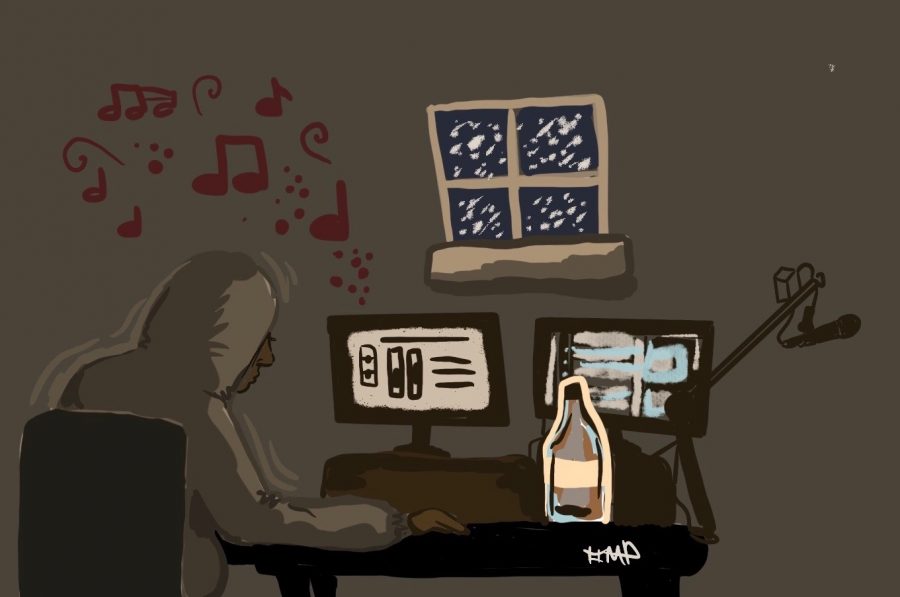Male rappers are more than their music
October 23, 2020
May, 2017. Long Island born rapper Lil Peep is due to take the stage at his concert in Los Angeles. Well, if he can find it. He’s clearly disoriented, reaching out through a drug induced haze to anyone who can guide him towards the screaming crowds, muttering, “Where are we going?”
Once he makes it on stage he stands hunched over, black and pink hair hanging over his face as if in an imitation of the girl from “The Ring.” He turns, staring behind him into the massive screen playing a montage of an explosion, mumbling a few words to his intro song into the microphone.
Months after his dissociative introduction to his Los Angeles concert, Lil Peep would be found in his tour bus, dead from an overdose of fentanyl, cocaine and a cocktail of opioids strong enough to put a bull elephant on his knees.
Peep’s death was followed by Mac Miller in 2018, who overdosed on counterfeit Percocet pills swapped with fentanyl in his Los Angeles home. Then came Juice Wrld in 2019, who suffered drug induced seizures at Chicago Midway Airport after a police raid on his private plane.
In today’s emo rap scene, rappers seem to share a common aesthetic: bodies covered with tattoos, lyrics laced with themes of suicide and depression and heavy drug use that inevitably leads to young deaths.
The problem lies in the hip hop industry.
If rock music is the soul of the music business, hip hop is at its heart. And if hip hop is the heart, the talent is its blood. These men and women, many of whom are less than 20 years old at their debut, are pumped through the system with little regard to their mental wellbeing or stability.
As a result, many of them spiral into depression and crippling anxiety, fueled by pressure from their industry to succeed, and the looming feeling that those around them are only using them for fame.
Their record labels don’t help. Rappers are a dime a dozen, and with the help of streaming services like SoundCloud and Spotify, talent agencies have thousands of new artists at their fingertips. To their fans Mac, Juice and Peep might be irreplaceable, but to their record deals, these artists are moving pieces in the quest for a hit.
So, they turn to self medication- binge drinking, marijuana, cocaine and prescription drugs- turning drug abuse into as big a part of rap culture as expensive watches and fancy cars.
Depression sells. It’s relatable, it’s shocking and it makes fans feel closer to their favorite artists, knowing they’re all going through similar things. So, artists dig themselves deeper into addiction and mental illness, hoping that somewhere in rock bottom, they’ll find the theme for the hit single that will keep them from slipping into irrelevance.
Here’s where people, inside and outside the music industry, forget who we’re dealing with. Rappers aren’t tools of the trade. They’re men who the system has been failing for generations, whose problems have been overlooked or passed off as creative liberties or dramatics.
During quarantine, I got really into Machine Gun Kelly. He’s another tortured, tattooed white boy who uses cocaine and acid to save him from a childhood haunted by absent parents and poverty.
I like his music for running, since it’s angry and largely centered around death and giving up- two themes that frequently join my daily slogs down the waterfront.
Most of his songs are depressing, but “Glass House” off his fourth album is one of the worst. It’s about 2018, the self declared worst year of his life, and how he felt like the whole world could see him at rock bottom, and yet no one had taken the time to help him.
We have the privilege to watch from the sidelines as these artists grow and evolve as musicians. But it’s time to stop being bystanders. Of course it is difficult as fans to make changes in the monster that is the music industry.
But we can do smaller things. We can change the stigma around mental health, especially mental health surrounding men. We can work to end the glamorization of suicide and drug addiction.
Because we shouldn’t have to lose someone to recognize the severity of a problem. We saw it coming.
In a Rolling Stones interview a few months before he died, Mac Miller said in response to how he’d been doing the past few months, “I speak through my music. So when people say, ‘How’s he doing?’ I can just say, ‘Listen to the music.’ That should be able to tell you.”









Fully Erect Centaur • Oct 24, 2020 at 3:57 am
Wow man that’s deep. Groupies think these artists are like DIY projects, but they forget the Y in DIY… Don’t push him over the edge!